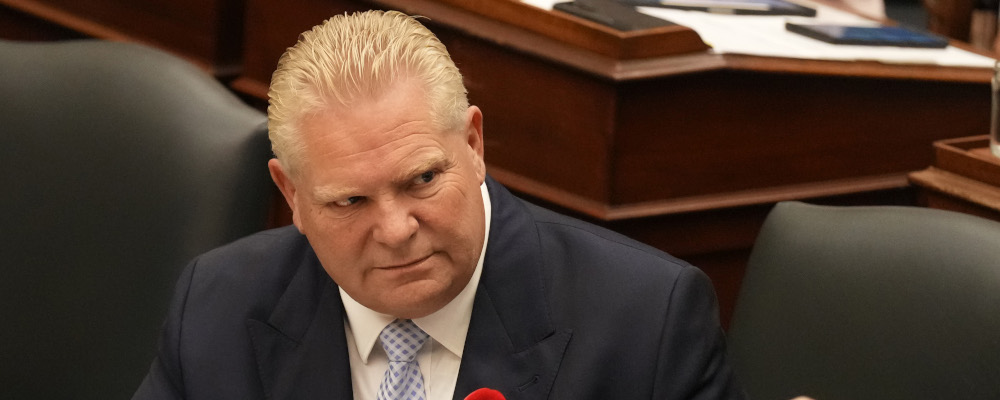Ontario is in the midst of a housing crisis. It didn’t start yesterday, and it will take a long time to fix. For years, federal and provincial governments were reluctant to get involved in housing policy, which was seen as a largely municipal issue.
Over the last two years, that has changed dramatically. Senior governments across the country have begun to recognize that they have the tools to increase housing production. If municipalities won’t do it, they can step in.
Premier Ford deserves a lot of credit for getting the ball rolling. His was the first big provincial government to take substantive action to get more housing built. But right now, he’s blowing it.
I’ve stuck my neck out a number of times to support many of Premier Ford’s reforms—even when they were imperfect and controversial. I want him to succeed in his target of doubling housing construction in Ontario. Lately, things have been going in the wrong direction.
I won’t dwell too much on the specifics of the provincial government’s recent housing challenges. The Greenbelt politics loom large, but I think they’re a symptom of a bigger problem: a focus on ad hoc decisions rather than broad rule changes.
Political discretion is a big part of the reason why we’re in a housing crisis. A lot of people tend to assume that housing has traditionally been a free-market industry. That politicians sit back and let developers do what they want. That can’t be further from the truth.
Building anything other than detached houses in most places has been illegal since the dawn of modern zoning. You couldn’t even build a duplex in most of Toronto until last year! Even where denser forms of housing are legal, they still need to gain city approval. Since city councilors are highly responsive to their constituents, the approval process often gets dragged out, increasing the cost of projects, and often reducing the number of units ultimately built—if they get built at all.
The Ford government has in many cases fought discretion with discretion. Ministerial zoning orders have been their tool of choice to push through housing that met with municipal opposition. Bill 23 was a move towards a broader policy approach. Imposing new rules on municipalities, rather than fighting over individual projects, is a welcome approach.
The new approach was buttressed by the report from the province’s Housing Affordability Taskforce. The report had 55 recommendations, calling for 1.5 million houses to be built over a decade. The report is a credible roadmap for that goal.
The government has made some progress in implementing the report’s recommendations. According to their progress report, 23 recommendations have been fully implemented and 14 are in progress, with 37 under review. That’s not bad. Still incomplete, but a good start.
Unfortunately, the premier has gotten sidetracked recently, arguing with the feds. The bone of contention is that the federal housing minister has been going around making deals with municipalities to upzone in exchange for federal dollars through the Housing Accelerator Fund. I can’t speak to the Premier’s motivation for this fight, but it’s shortsighted.

The federal minister is giving the premier political cover here. He’s getting municipal governments to make tough reforms the premier hasn’t thus far been willing to impose. Indeed, many of these reforms are straight out of the Housing Affordability Taskforce report. The premier doesn’t have to drive the bus, but he really shouldn’t stand in front of it. If the premier doesn’t like that the federal minister is stepping on his turf, he can solve his issue with a single press conference. He can fully commit to implementing all of the Housing Affordability Taskforce’s recommendations in a timely manner. If he doesn’t, the next premier will. All of the major candidates for the Ontario Liberal Party leadership have vowed to implement the task force recommendations. He can get back in the driver’s seat and be the man who fixed Ontario’s housing crisis. Or he can be remembered as the last gasp of Toronto NIMBYism.
The premier’s legacy is on the line here. He played a crucial role in the unfolding housing policy revolution in Canada. If he wants to be remembered as a builder, rather than a status quo politician, it’s time to go all-in on meeting his stated goal of building 1.5 million houses over a decade. That means embracing all of the recommendations of the Housing Affordability Taskforce, and not getting fussed if the federal minister wants to do some of the work for him. It’s time to build, not to slow down.
Recommended for You

Trump’s tariffs, tax shocks, and long-standing stagnation—how Canada can counter emerging economic threats: DeepDive

‘A festival of hot air’: Why it’s time to be done with the tone-deaf Davos elites

How can Canada have a housing shortage while homes sit unsold?

Pierre Poilievre needs a foreign policy plan



